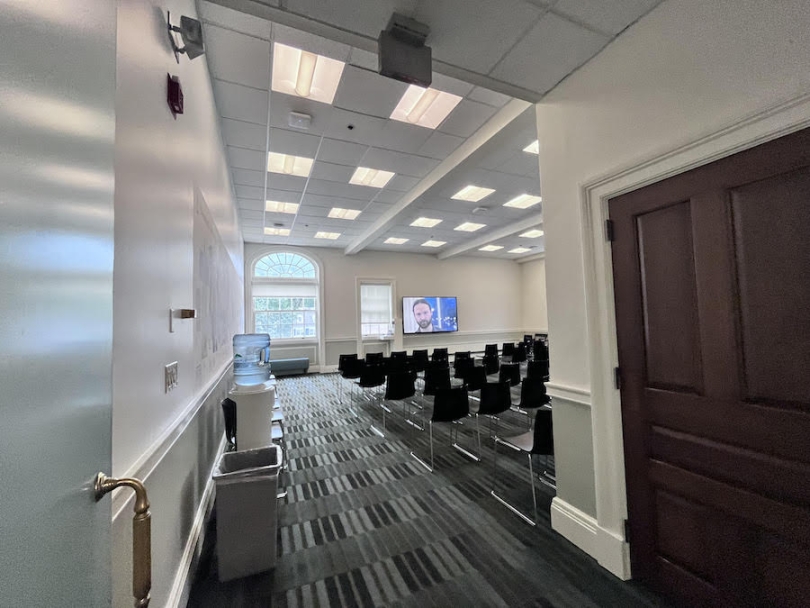
How to Make the Most of Your Campus Visit
If you're anything like me, at some point, the college visits will start to blur together, and if you've visited dozens of schools, I can't fault you for it—it can be tiring taking in so much information, especially when so many schools seem to have so much in common. You're going to take classes and study subjects and live in dorms (or not) and engage with professors and meet peers and eat at the dining hall anywhere you go, and it all starts to feel a bit in-one-ear-and-out-the-other. That's totally normal, but it's still really important to get as much as you can out of each visit! Now that I've been leading tours, giving info sessions, and otherwise engaging with visitors to Dartmouth for a few years, I thought I'd write a post with some of my advice for making the most of each campus visit! Quick disclaimer: none of this is official admissions advice, just my perspective as a longtime student employee of the admissions office! Also, since it's specifically informed by my experience at Dartmouth, this is probably best applied to a Dartmouth campus visit, but most of it probably applies to any campus you've visited! Without further ado—my eight tips for making the most of your campus visit!
-
Visit while tours are running! This is super basic, and I'm a hypocrite for saying it—I never took a campus tour at Dartmouth and ended up here anyway—but I stand by it. Exploring campus on your own is great, and I'll say more about that later, but the very best way to get a feel for a school is through face-to-face interaction with current students, and taking an official campus tour is the only way to guarantee that. Register for a tour in advance so that you have a spot reserved, and rest assured knowing that you won't show up for a tour just to find out there aren't any that day (this has happened to me—we only made that mistake once)!

It won't be empty when you come here, but this is the Reitman Room, where your information session will be held! On the screen in this photo is our playlist of Dartmouth-themed videos that'll be running as visitors arrive. -
Register for a tour that has an information session beforehand. If your schedule works better with one of our tours that doesn't have an info session before it, then make sure to sign up for and attend one of our virtual info sessions at some point! You'll get some really valuable information about our sense of place, academic program, tight-knit community, and application process. Of course, you'll see most of this in action on your tour, but having that context from the info session in advance is really important to a greater understanding of what you're seeing and hearing as you follow your guide around campus. (Also, if you sign up for an info session, maybe it'll be my info session, and I'll get to meet you!)
-
Keep a journal of all your college visits. This is another thing I didn't do but wish I did—it's the best antidote to the tours-and-info-sessions-blurring-together phenomenon. On each visit, just jot down a few of the highlights or things that strike you as distinct from the other schools that you've visited. That way, you'll have a quick reference to go back to after you've been on ten college visits in five days and can't remember which school had its own ski hill (it's Dartmouth, by the way)! Don't worry too much about writing down every single detail you hear because, at some point, it'll defeat the purpose, but having a way to track and organize your primary impressions and thoughts as you go through this process will be invaluable.
-
Ask questions! This is probably the most important piece of advice I can give you—if you're wondering about something, ask about it! No question is too big or too small. In fact, answering questions is exactly what your tour guide is here for. As a pretty shy and introverted high schooler, I remember being hesitant to ask questions because I didn't want to accidentally ask something that the guide thought would be obvious or wouldn't know how to answer. Though, now that I am a tour guide, I can definitely say there are no bad questions. In fact, I'm a tour guide because I like talking to prospective students and families, and I continue with the job because I enjoy hearing from you and answering your questions! Over three years of giving tours, I'll admit sometimes I do get asked questions I don't know exactly how to answer, but in that case, I won't leave you without an answer—I'll direct you to an admissions officer, our "Connect with a Student" page, or another Dartmouth resource or webpage. I can't speak for the exact format at other schools, but our info session is designed to lead straight into your tour after it concludes, so I'd recommend asking questions to your guide first and not to your presenter right after the session. Still, if you have more questions after the tour concludes, the admissions office is open until 4:30 PM on weekdays, and you're welcome to head back upstairs and ask to speak to an admissions officer and/or the person who delivered your info session. Ultimately, your guiding principle with this should be that not asking guarantees that you won't get an answer, so when in doubt, ask the question!
-
Check the weather. This one probably also sounds obvious, but it's something I see more often than you'd think, including as something that I often forget to take into consideration myself as a guide! We'll take you into some buildings, but you will be outside for much of your tour. Dress for the heat or the cold, depending on the forecast and the time of year. If it's summer, bring water—I cannot stress this enough! Even if it's not a million degrees, walking around in the sun for over an hour can be dehydrating. If it's going to rain, bring an umbrella, etc. All the standard things you do to be outside in different weather are super important for your tour, especially if you're going to be trying to focus on listening to someone talk the whole time.
-
Remember that your tour guide does not read applications! This one is pretty self-explanatory—tour guides have no say or influence whatsoever in the actual admissions process. Nothing you do or don't say to them will have a direct effect on your chances of getting admitted, as they do not have a part in that process; at the end of the day, they're just Dartmouth students sharing their experience with you so you can learn more about what it's like to go here. Also, because they don't read applications, a tour guide cannot tell you exactly how your admissions decision is going to be made or what your chances are of being admitted; they simply don't have that firsthand knowledge. I'm always happy to answer questions about what I think went well for me and how I'd recommend approaching it from personal experience, but I ultimately cannot speak to exactly how your application will be evaluated. That being said, it's also worth noting that any admissions officer you talk to will probably not be able to give you a whole lot of definitive answers either—the process is simply too highly individualized and dependent on many factors from year to year for that to be possible. By all means, ask for all the application advice and information you'd like, and you'll get a lot of valuable info; just go in prepared to not get as clear of answers as you'd like on certain topics. I really do get it—I was in your shoes just a few years ago, and the uncertainty can be incredibly overwhelming and stressful—but as I say in all of my info sessions, the fact that you're here and interested in a school like Dartmouth probably already means you're a very promising student with the drive and potential to create success for yourself anywhere you go and whatever you do!
-
Explore campus on your own after the tour. Going back to #1 (I hope you're enjoying my listicle debut, if you don't already count the anthropology minor post from a while back), as much as I seriously recommend that you go on an official campus tour here, exploring parts of campus you're especially interested in on your own time afterward can help you get even more out of your visit. Taking advantage of our self-guided tour maps is a great idea, but even beyond that, most academic buildings are unlocked and open to the public during the day as long as you're not interrupting classes. For instance, when I visited Dartmouth (albeit with no tour), I found that the linguistics department was in Reed Hall at the time (thanks Google!) and was able to take a look at some of the research posters and informational literature about that particular department. If I hadn't gone into Reed Hall that day, I never would've found out about the Linguistics FSP, which was one of the biggest factors that drew me to Dartmouth, and I never would've had the hour-long meeting with Professor Stanford that completely sold me on the Dartmouth Linguistics department. If possible, try to budget some extra time after your tour, and whatever you're interested in, see if you can find it on campus—you never know what you might discover!

-
Above all, enjoy it and take it all in! Seriously. Don't try to memorize every piece of information you're given point for point. It's impossible but also serves no real purpose. Whichever college (or trade school or job) you find yourself at, your experience will be a human one, not a series of facts and figures. As you walk around campus, yes, listen to your tour guide, ask questions, keep a journal, but above all, take a few moments to take in what's around you. Try to get as clear of a mental image as you can of what your life might look like here. That's not just going to classes—that's making friends, that's spending time outside, that's eating, sleeping, going into town. Anywhere you go, your entire life will be taking place, not just school. If you can construct a vision that you really like of what that would mean for you at any given school, great! Maybe you want to apply there! That means that if you don't like it, that's okay too—at the end of the day, this process is about discovering what will and won't work for you, and while the "perfect" fit probably doesn't exist, it's certainly not one size fits all. If nothing else, speaking as someone who really felt like college applications were the end of the world just a few years ago, know that no matter what happens, it really will be okay. Keep what's best for you and your well-being in mind, and have faith in yourself—wherever you end up in a year or two, you're still you, and that means you've got what it takes to continue forging your path. It'll all work out in the end, I promise. But in the meantime, enjoy your tour!
















